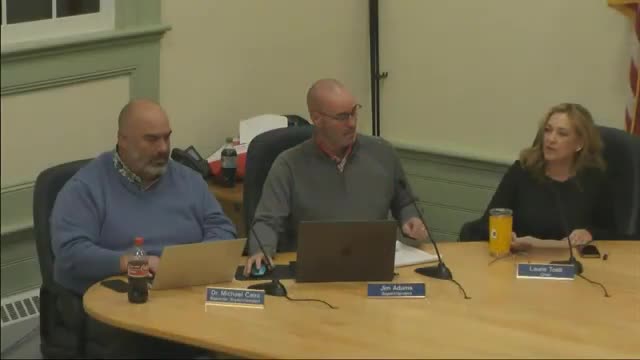Ashland committee approves plan to shift middle‑school world language toward 8th‑grade Spanish; current French students to be allowed to continue
Get AI-powered insights, summaries, and transcripts
Subscribe
Summary
The Ashland School Committee voted Tuesday night to approve the superintendent’s recommendation to restructure world‑language offerings at Ashland Middle School, citing persistent teacher shortages and declining French enrollment at the middle‑school level.
The Ashland School Committee voted Tuesday night to approve the superintendent’s recommendation to restructure world‑language offerings at Ashland Middle School, citing persistent staffing shortages and declining enrollment in French at the middle‑school level.
Superintendent Adams told the committee the proposal aims to reduce disruption this school year while giving administrators space to build a more sustainable program. Under the plan, French 8 will continue to be offered for students currently enrolled this year and next; 7th‑grade students will be given the option to switch into Spanish this year to prepare for 8th‑grade Spanish; and beginning in the 2026–27 school year the middle school will move to a model that provides 8th‑grade Spanish (with no routine 7th‑grade language class under the proposed schedule).
The recommendation draws on data and staffing realities at Ashland Middle School: administrators reported two sections of 7th‑grade French (33 students), eight sections of 7th‑grade Spanish (162 students), and 16 students enrolled in 8th‑grade French this year. The district began the school year with five dedicated world‑language teachers (four Spanish, one French), but several mid‑year separations left the middle school short of certified instructors. Adams said a retired teacher will take an 8th‑grade French assignment starting in January but that position is temporary.
“Given the current staffing and enrollment patterns, I believe we need to continue with French 8 in the current year, 2024–25, now that we’ve hired a long‑term sub in French,” Superintendent Adams said during the meeting. He also told the committee that the phase‑out plan is intended to avoid leaving current French students without the opportunity to take an 8th‑grade French course this year.
Administrators described recruiting challenges that extend beyond Ashland. LaChapelle, who the superintendent identified as the middle‑school administrator leading the schedule review, said the district posted openings widely (LinkedIn, SchoolSpring and other channels), contacted university education departments and the French consulate, and pursued retired teachers. She and other staff described multiple hires who subsequently declined or left positions; the administration reported interviewing candidates as recently as late November and continuing to pursue applicants.
LaChapelle described schedule constraints that shape what languages the middle school can offer. She said middle schools differ from high schools because language offerings must fit into a team‑based schedule (core classes such as math, English, science and social studies). That, she said, limits the district’s ability to run multiple small, single‑section language courses without creating inequities in teacher loads and crowded classes elsewhere in the schedule.
The committee debated alternatives and asked about online or hybrid models. Adams and LaChapelle cited options such as Proximity Learning, EduSeer and other virtual providers that employ certified teachers remotely; they said such models can be synchronous and aligned to Massachusetts curriculum frameworks but require classroom monitoring and bargaining‑unit discussions. LaChapelle said any remote provider would teach the district’s curriculum and frameworks.
Members of the public urged the committee to preserve French. Several residents described personal or family ties to French and argued early exposure improves long‑term proficiency. High school principal Kelly St. Kerr said students can reach Advanced Placement level through various pathways, but acknowledged it is easier for students who enter high school having completed a year equivalent to Spanish 1 or French 1.
After public comment, the committee approved the superintendent’s recommendation by voice vote. The motion as recorded was to “approve the recommendation of the superintendent with regard to the middle‑school world language program.” The committee recorded five yes votes and no opposing votes.
The committee and administrators stressed the decision is intended as a near‑term, staffing‑driven course correction rather than a permanent end to multiple world languages in Ashland. Adams and other committee members said the district will continue to explore ways to restore or expand language options — including virtual instruction, new language offerings such as Portuguese or American Sign Language, and efforts to recruit and retain certified language teachers — and will revisit the plan if staffing or student interest changes.
The vote gives the superintendent and LaChapelle authority to implement the scheduling changes needed for the coming terms and to continue recruitment and scheduling work during the district’s budget cycle. Committee members asked administrators to report back with schedules and details as plans firm up and to preserve options for families when feasible.
Votes at a glance
- Motion: “Approve the recommendation of the superintendent with regard to the middle‑school world language program.” - Outcome: Approved (voice vote). Recorded yes votes: Marcy (yes), Tina (yes), Paul (yes), Mark (yes), [fifth committee member recorded yes].
Community reaction and next steps
Public commenters and several committee members urged continued effort to preserve French or to offer multiple languages, noting potential long‑term effects on the high‑school program and community perceptions. Administrators said they will continue active recruiting, evaluate virtual providers, work within collective‑bargaining constraints, and return to the committee with scheduling details and any sustainable alternatives they identify.
The committee reserved the right to revisit the decision if staffing or demand changes.
